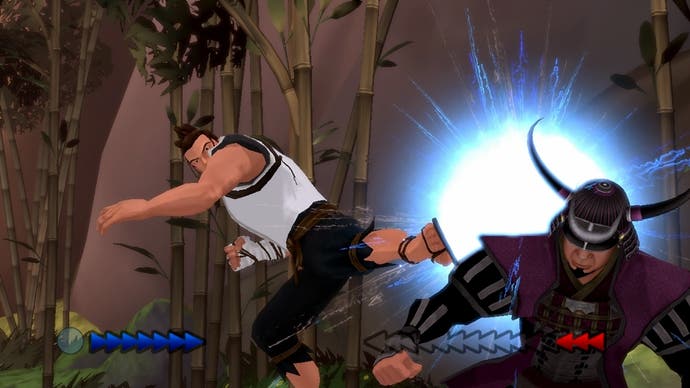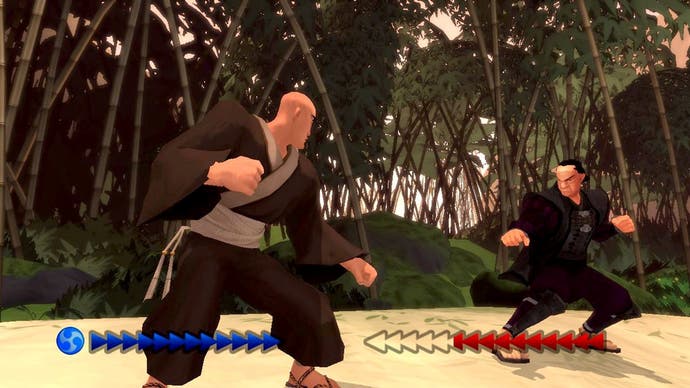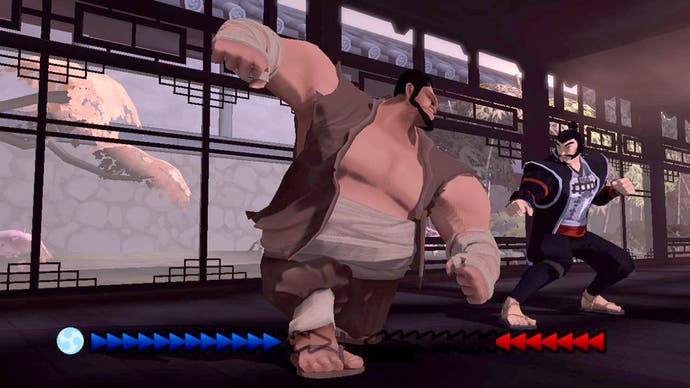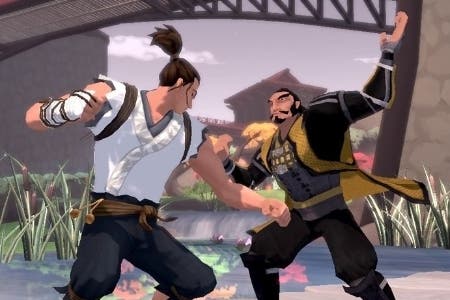Karateka review
The brute, the monk and the true love.
Mariko, just like every winsome princess trapped against her will in a castle, longs to be rescued. But being rescued isn't her only longing. There is, of course, the delicate matter of the rescuer.
Salvation is all well and good, but the specifics of the saviour are just as important. Who's the face behind the silhouette in the doorway; what's the torso beneath the shirt? A/S/L? Oh, there'll be smiles and grateful flutters of eyelashes no matter who topples the guard and bursts triumphant into the bedroom, but the man (or woman) should match the moment. Anyone else - unmentionably, unthinkably - might bring disappointment as well as freedom.
'Rescue the princess' is a premise as old as video-game time; at least as old as Karateka, a game originally released in 1984 when its maker, Prince of Persia creator Jordan Mechner, was a student at Yale University. But Karateka plays with the premise in a way few of its descendants have dared - ensuring this remake still feels unfamiliar some 30 years later.
You assume the role of a brave suitor, fighting your way through the long, winding line of Japanese soldiers that stand between you and Mariko. In Karateka you have three lives but, unusually for a video game, they are three different lives. You begin by assuming the role of Mariko's true love, a handsome warrior with a flicking ponytail, doe eyes and a grim jaw. But should one of the scores of guards get the better of you, your limp body will be thrown from the cliffs, never to return. This death is not the end of the quest; you may continue to fight from the place Mariko's true love fell. But you now must do so as a new suitor - and a less desirable one at that.

The quiet monk is Mariko's second suitor, only called into play if her true love falters. This holy man fell for the girl when peeking through pious fingers during prayers one morning - an epiphany of longing. He's not her ideal rescuer - the devout are usually objects of quiet admiration, not desire - but he'll do in a pinch. So you continue on your snaking journey towards the princess. And should the monk fail to make it past the guards to defeat Akuma, the cruel Lord imprisoning Mariko? He too is thrown over the cliffs without ceremony.
This leaves just one life left, one final suitor in the rescue relay: the brute. This overweight oaf with tree-trunk forearms and mallet fists is the most powerful of the three, the most doggedly determined. But, while he's undoubtedly single-minded, he's also half-witted. His eyes splay off at wild angles as his fists wheel and arc with lethal indiscretion. His profile suggests diabolical strength, but it also suggests type two diabetes. Make it to Mariko's boudoir in his guise and you'll win the game, but she'll struggle to hide the grimace behind the gratefulness.
Karateka has three endings then, directly linked to your proficiency. In each the conclusion is practically the same: the princess is rescued. But her happiness is entirely tied to your ability, to the specific suitor who arrives at her door.
"In Karateka you have three lives but, unusually for a video game, they are three different lives."

Your role, then, is to excel in the one-on-one battles that pepper the journey. When you peel back the visuals, these play out like a series of rhythmic encounters. You must block incoming attacks by listening out for the audio cues - one pluck on a shamisen indicates a one-punch assault, two plucks for a one-two combo, and an arpeggio to signal an impending flurry of jabs. Successfully block the final attack in the series and you can follow up with moves of your own, combos created from your two offensive attacks. Wreck your enemy's life bar and you are able to move on, stopping momentarily to pick one of Mariko's purple, life-restoring flowers in preparation for the next fight.
The path to Mariko's room is entirely linear but dips and winds in 3D space, taking in lush Japanese gardens, dark forests and wind-worn cliff tops. In musical terms, the path is the stave, the battles the melodic phrases and the punches the rhythmic beats.
In the early stages of your journey, the rhythms of the attacks you must foil are straightforward, easy to anticipate and tap out defences. But as the game progresses so the attacks grow in rhythmic complexity, with pauses, feints and lunges that must be carefully repeated with Simon Says stabs of the block button. Battles with human guards are interspersed with fly-by attacks from Akuma's hawk, which must be blocked in a similar fashion, and then followed up with a high or low attack depending on where the stunned bird hovers in space. Choose incorrectly and you leave yourself open to a counter-attack.

You play against the clock as well as Akuma's minions, with point bonuses and achievements tied to how quickly you make it to the various areas leading up to the castle and how soon you manage to defeat the capturer himself. Each encounter also nets a handful of points according to how proficiently you protect your health bar. These points form your final score but also, in a concession to contemporary tastes, can be traded for continues once your three main lives have been lost at a cost of 3000 points per retry.
It's a straightforward game, then. The capacity for expression and technique is limited to the exacting rhythms of blocking. Counter-attacks, by contrast, can be mashed out without much thought, while the journey between fights is taken along series of straight lines linking the spectacle. The camera work is artistically assured, picking out the most striking lines to pull your view and inject the somewhat repetitive action with drama, while the pacing of the choreography is full of pause and effect. But a semi-competent player will reach the conclusion in 30 minutes and, once the princess is rescued, the only incentive to do so again comes from whether you care enough about her true feelings beneath the weakly thankful smile. (Or, of course, the leaderboard.)
Karateka is a game about longing for perfection. It's in the achievement design, which offers great rewards to the player who saves Mariko, greater rewards to the player who saves her in the guise of her True Lover and the greatest reward to the player who saves her without sustaining a single point of damage, arriving at her door perfect and free of blemishes. It's more-so in Mariko's eyes as she looks out of her hostage's window, praying not for any saviour but for her fairytale saviour. Your investment in this tale depends on whether you view her as shallow or sincere.




